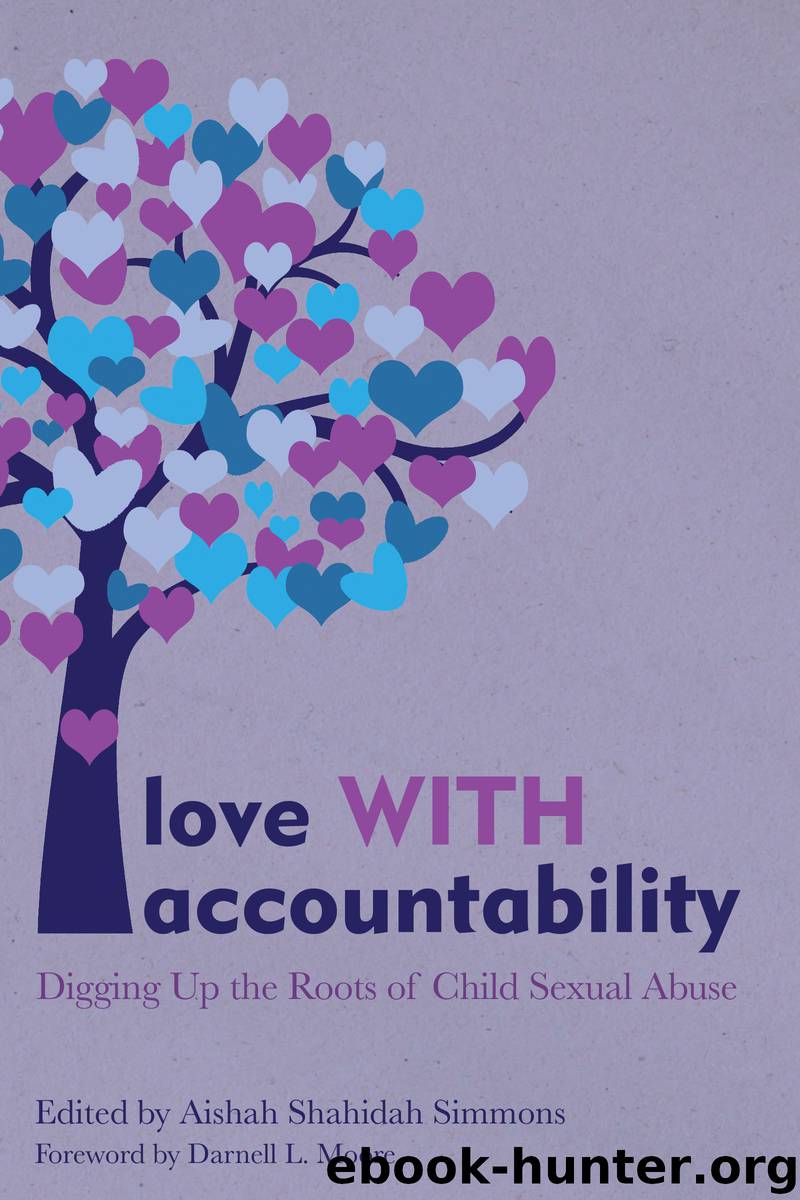Love WITH Accountability by Simmons Aishah Shahidah; Moore Darnell L.;

Author:Simmons, Aishah Shahidah; Moore, Darnell L.;
Language: eng
Format: epub
Publisher: AK Press
Published: 2019-07-30T16:00:00+00:00
69. Toni Morrison, “Black Matters,” in Playing in the Dark: Whiteness and the Literary Imagination (New York: Vintage, 1993).
CHAPTER 25: Colliding Traumas
Esther A. Armah
We’re taught to put a lot of pain in the shadows—we’re taught to do that as African women . . . what’s that thing that is in the shadows.
—Peres Owino, Bound: Africans vs African Americans
Giving without receiving isn’t love. It is hatred of the giving self.
—Ayi Kwei Armah, Two Thousand Seasons
Sifting through the broken glass that held my promise and my dreams
I’m just gathering pieces, To get here
I’m just holding myself, To get here
I’m livin’ on stolen breath.
—Imani Uzuri
Esi. She was turning fifteen. She danced the shaku, shaku. She lived in Teshie, a busy suburb in Accra, Ghana’s capital. She liked her hair cut just so. She headed to the barber to get her hair done. He was her regular barber. He was her pop’s friend. She knew him. He knew her and her family. On that day he locked the shop door. He raped her.
Esi told her pop.
Esi, her pop, and her family gathered. Some stood. Some sat. The barber and his family came too. The barber stood. His family sat. They had gathered before. Esi’s barber had been in her family’s home many times. He and her pop shared a Star beer on a Friday night. They laughed together, shared stories of the craziness of Ghana’s politicians and the latest rants on Joy FM radio—their morning radio station of choice. This was a familiar family ritual.
This gathering, though, was different.
The barber didn’t call Esi a liar. He said he “had sex” with Esi.
⁑⁑⁑
It wasn’t sex. It was rape. In Ghana, that is classified as “defilement.” Right now, I live in Ghana, and I hear that word “defiled” a lot. It is how rape of children under the age of sixteen is described by our antiquated laws. Dictionary definition: “sullied,” “marred,” “spoilt,” “ruined,” “tainted.” Defile: “to make unclean, unfit, or impure,” “to corrupt the purity.” The twenty-first-century interpretation: victim-blaming and -shaming while perpetrator-shielding.
I don’t know the barber’s name. In the media, it was only hers we learned. She was underage, then. She is not now. A reporter wrongly included her name and age in the story. He was chastised across social media. It was too late. Her name was out there. His was not.
The two families gathered. Drinks were offered. Some “small chops” were served, as we call snacks in Ghana.
The barber appealed to Esi’s pop to think of their long friendship, his family, his business, and his future. Her family nodded and murmured.
Esi’s pop agreed. We don’t know what her mother said. We know she was there. Esi was not asked and did not share the impact of the rape on her body, mind, or soul.
The result? The two families protected the barber and the friendship. They didn’t report the rape to the police. That was the end of the matter.
In Ghana, through a complicity that is cultural and communal, families—men and women, representing both
Download
This site does not store any files on its server. We only index and link to content provided by other sites. Please contact the content providers to delete copyright contents if any and email us, we'll remove relevant links or contents immediately.
| African-American Studies | Asian American Studies |
| Disabled | Ethnic Studies |
| Hispanic American Studies | LGBT |
| Minority Studies | Native American Studies |
Cecilia; Or, Memoirs of an Heiress — Volume 1 by Fanny Burney(31332)
Cecilia; Or, Memoirs of an Heiress — Volume 3 by Fanny Burney(30934)
Cecilia; Or, Memoirs of an Heiress — Volume 2 by Fanny Burney(30889)
The Great Music City by Andrea Baker(21283)
We're Going to Need More Wine by Gabrielle Union(18072)
Bombshells: Glamour Girls of a Lifetime by Sullivan Steve(13108)
Pimp by Iceberg Slim(12931)
All the Missing Girls by Megan Miranda(12747)
Fifty Shades Freed by E L James(12449)
Norse Mythology by Gaiman Neil(11882)
Talking to Strangers by Malcolm Gladwell(11875)
Crazy Rich Asians by Kevin Kwan(8349)
Mindhunter: Inside the FBI's Elite Serial Crime Unit by John E. Douglas & Mark Olshaker(7833)
The Lost Art of Listening by Michael P. Nichols(6472)
Enlightenment Now: The Case for Reason, Science, Humanism, and Progress by Steven Pinker(6405)
Bad Blood by John Carreyrou(5768)
The Four Agreements by Don Miguel Ruiz(5510)
Weapons of Math Destruction by Cathy O'Neil(5036)
We Need to Talk by Celeste Headlee(4868)
